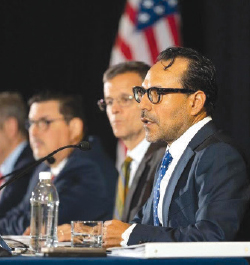
The Puerto Rico Financial Oversight and Management Board
By GREGORIO IGARTÚA
Special Contribution to The STAR
The Puerto Rico Financial Oversight and Management Board is diligently and sincerely striving to reform and address Puerto Rico’s fiscal difficulties as mandated by Congress. Nevertheless, I believe that its fiscal endeavors will be in vain unless it recognizes the underlying cause of the economic issues it aims to remedy.
As I have outlined in correspondence to former chairpersons of the oversight board, José B. Carrión III (6-16, 2020) and David A. Skeel (1-26, 2021), as well as during a lunch discussion with the current executive director, Robert Mujica, eight weeks ago, the core issue is the unequal and/or discriminatory treatment of American citizens/residents of Puerto Rico by Congress and the executive branch in terms of federal assistance to Puerto Rico, which is significantly less than what is provided to states. In this regard, the Popular Democratic Party’s misguided insistence on maintaining the status quo is causing us to lose over $20 billion in federal funding each year.
I contend that it is high time for the oversight board to show that it is addressing Puerto Rico’s financial crisis from the appropriate perspective, recognizing this reality, and informing the president, Congress, and the governor of Puerto Rico about it. Achieving equal treatment for Puerto Rico on par with the states is the sole path to resolving the fiscal crisis.
However, from the board’s operational perspective, Puerto Rico’s fiscal issues will never be resolved within a federal structure where it is disadvantaged due to being treated unequally with lower economic aid transfers compared to states. This inequality is the root of the severe issues within Puerto Rico’s fiscal architecture, budget implementation, public administration, and tax system. It is impossible to reform economic policies to alleviate our financial crisis under an unequal treatment scenario and amidst such an economic maze.
Although I did not receive any replies from Mr. Carrión or Mr. Skeel, I had the opportunity to personally address the issue with Mr. Mujica during the previously mentioned lunch meeting. I conveyed to him how the oversight board had neglected to communicate to Congress that the true cause of the bankruptcy was the discriminatory treatment regarding financial assistance provided to Puerto Rico, a de facto incorporated territory that is nearly on par with a state (as evidenced by prior GAO reports, and as articulated in G. Igartúa’s work “The de facto incorporated US territory of Puerto Rico”).
He acknowledged my point, but emphasized that the Puerto Rico Oversight, Management and Economic Stability Act, widely referred to as PROMESA, prevents the board from engaging in the political sphere in addressing the financial matter. Section 402 of PROMESA states, in pertinent part (Public Law 114-187 – June 30, 2016, (130 Stat. 586) (48 USC 2192.)): “… Nothing in this Act shall be interpreted to restrict Puerto Rico’s right to determine its future political status, including by conducting the plebiscite as authorized by Public Law 113-76. …”
In my opinion, the board’s interpretation of Section 402 regarding this matter is overly restrictive and misguided. The board is following its interpretation of the law, hitting a dead end by failing to inform Congress of the true basis for Puerto Rico’s bankruptcy and financial crisis. Recognizing the reason for bankruptcy would assist both Puerto Rico and Congress in their efforts to support us. We are all American citizens in Puerto Rico, and we deserve that our fiscal challenges be addressed based on our current reality, not on hypothetical scenarios of what we could be, or what we are not (Mora v. Mejías 206 F2d 377).
Regrettably, this issue is tied to our political status of not being recognized as an incorporated territory or a state. Our current political relationship has evolved under self-determination. We willingly embraced our American citizenship and established our own Constitution in adherence to the federal requirements set forth by Congress. Therefore, the provisions of Section 402 were satisfied and permitted the oversight board to confront the issue of differential treatment from the correct viewpoint. Designating Puerto Rico as an incorporated territory would grant us equality in federal aid. Incorporation is necessary as a precursor to statehood (Guerrido v. Alcoa Inc. 234 F2nd 349).
In summary, the fiscal board’s limitations are detrimental to Puerto Rico.
Gregorio Igartúa is a lawyer with a practice located in Aguadilla.
